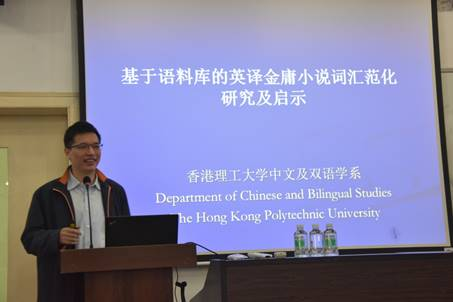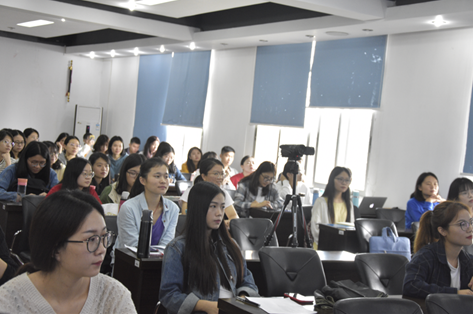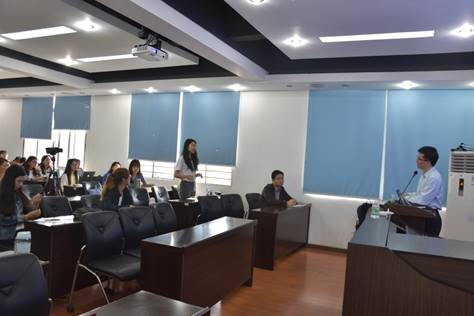On October 18, 2018, Dr. Li Dechao of Hong Kong Polytechnic University was invited to give an academic lecture entitled “Research and Its Enlightenment on Lexical Normalization of English Translation of JinYong’s Novels Based on Corpus”. This lecture is presided over by Professor Zhu Xianlong from School of Foreign Languages.

(Dr. Li Dechao speaks passionately)
Focused on “corpus”, Dr. Li Dechao analyzed the enlightenment brought by the lexical normalization research in English translation of JinYong’s novels from the perspective of corpus. In recent years, the research on how Chinese literature “going global” has become a hot spot in the translation field, including the discussion on the translation and introduction of Chinese special novel type——martial arts novel. However, most of the researches on the translation and introduction of martial arts novels are based on the traditional qualitative methods of text or literature analysis, which are subjective. From the “Normalization concept”, “Research and deficiency of normalization at home and abroad”, “The purpose and results of this study”, and “The enlightenment of the research results to Chinese literature’s ‘going global’ ’’, Dr. Li respectively explained the status of translation studies from the perspective of “corpus” and the future research directions and hot spots, and analyzed the relationship between translation motivation and strategy, the standardization of translation words and the acceptance of translation can bring enlightenment to the “going global” of Chinese martial arts literature and even the whole Chinese literature at present, opening the door of academic hall for students.
At the same time, Dr. Li Dechao also shared the methods and skills of writing academic papers with students according to their learning situation. When using the corpus to write and analyze papers,Professor Li instructed students that they should not simply pile up domain data, but only do macro analysis, which tends to be formalized easily. Instead, they should carry out micro analysis, mine the conclusions behind the data through quantification and experiment,and combine with hot issues, so as to find a suitable entry point.Only in this way can research be valuable.

(Students listen carefully)
In addition, from the perspective of corpus, Dr. Li made a comparative translation study on three English versions of Jin Yong’s novels, Fox Volant of the Snowy Mountain translated by Hong Kong scholar Mo Jinping, The Deer and the Cauldron translated by British sinologist Minford, and The Book and the Sword translated by English sinologist Yan Gewen in his lecture, and investigated the students' cognition of the three versions on the spot to show that there are great differences between the research results from the empirical perspective and subjective cognition or hypothesis.
In the Q&A session, Dr. Li actively interacted with students and had an in-depth exchange on the current situation and difficulties of “going global” of Chinese literature and its future development.

(Students actively ask questions)
Attachment:Brief introduction of the keynote speaker
LiDechao, Associate Professor, Department of Chinese and Bilingual Studies, Hong Kong Polytechnic University, and Associate Dean, School of Humanities. He graduated from South China Normal University (1998)with a bachelor's degree, Sun Yat-sen University (2001) with a master’s degree and Hong Kong Polytechnic University (2007) with a doctor's degree. He joined the Hong Kong Polytechnic University in 2008 and taught at the School of Foreign Languages of Sun Yat-sen University in Guangzhou (2001-2002) and City University of Hong Kong(2005-2007). He is former Deputy Director, Department of Chinese and Bilingual Studies, Hong Kong Polytechnic University. He is also a visiting researcher at the Institute of Intercultural and Translation, Jinan University, Guangzhou. He has directed a research project jointly funded by the Economic and Social Research Council of the United Kingdom and the Research Grants Council of the Hong Kong SAR Government, entitled Comparative and Parallel Corpus Approaches to the Third Code: English and Chinese Perspectives. In 2010, he won The President's Award of Hong Kong Polytechnic University. From June to August 2011 and June 2012, he was funded by Erasmus Mundus MULTI exchange project of European Union, and visited the Creative Writing, Translation and Publishing Center of City University of London, UK. His research fields include translation theory, corpus-based translation studies and empirical interpretation studies. He has co-translated two books, including Translation Studies:Comprehensive Method (co-translated with Zhu Zhiyu) and Encyclopedia of World History (co-translated with Gou Xiquan,etc.), and published more than 50 papers at home and abroad.
Graphic/Sun Xiaojing

